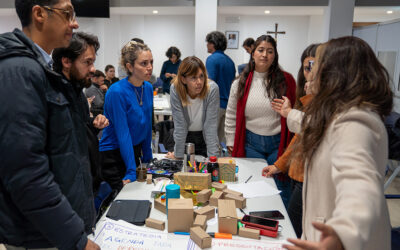> The day before the publication of the book, L-Arti tal Imhabba (The Art of Loving) Marisa and Mario from the Focolare community on the island comment: “We had the opportunity to present a book by Chiara Lubich translated into Maltese, and it’s made us very glad!” The book was presented in a crowded hall on January 17, 2014 in the presence of speakers from five fields of expertise: Professor Marie Alexander from the Malta University Linguistic Institute; Natalino Camilleri, General Superior of the Christian Doctrine Society (M.U.S.E.U.M.); Father Karm Debattista, well-known in Malta in the fields of music and communication; the Reverend Canon Simon Godfrey, Chancellor of the Anglican Church and Dr. J. Mifsud, lawyer, journalist and television presenter.
The day before the publication of the book, L-Arti tal Imhabba (The Art of Loving) Marisa and Mario from the Focolare community on the island comment: “We had the opportunity to present a book by Chiara Lubich translated into Maltese, and it’s made us very glad!” The book was presented in a crowded hall on January 17, 2014 in the presence of speakers from five fields of expertise: Professor Marie Alexander from the Malta University Linguistic Institute; Natalino Camilleri, General Superior of the Christian Doctrine Society (M.U.S.E.U.M.); Father Karm Debattista, well-known in Malta in the fields of music and communication; the Reverend Canon Simon Godfrey, Chancellor of the Anglican Church and Dr. J. Mifsud, lawyer, journalist and television presenter.  The speakers highlighted how the art of loving proposed by Chiara Lubich, is drawn directly from the Gospel and summarised in five points: loving everyone without discrimination; being the first to love; recognizing the presence of Jesus in every neighbour; becoming all things to all people as St. Paul says; and loving one another. The commitment to such a way of life is a constant daily effort, but it produces a spiritual disposition that is the first step towards a peaceful revolution capable of changing individual hearts and building a civilization of love. Rev. Simon Godfrey and Dr. J. Mifsud also highlighted the parallelisms between Pope Francis and Chiara Lubich. Following presentations by the speakers, a family, a young woman and a young boy recounted experiences of living the art of loving, and the Cube of Love was introduced. At the conclusion of the evening many expressed their joy at
The speakers highlighted how the art of loving proposed by Chiara Lubich, is drawn directly from the Gospel and summarised in five points: loving everyone without discrimination; being the first to love; recognizing the presence of Jesus in every neighbour; becoming all things to all people as St. Paul says; and loving one another. The commitment to such a way of life is a constant daily effort, but it produces a spiritual disposition that is the first step towards a peaceful revolution capable of changing individual hearts and building a civilization of love. Rev. Simon Godfrey and Dr. J. Mifsud also highlighted the parallelisms between Pope Francis and Chiara Lubich. Following presentations by the speakers, a family, a young woman and a young boy recounted experiences of living the art of loving, and the Cube of Love was introduced. At the conclusion of the evening many expressed their joy at  having discovered a new way to face daily life: “The message is simple, beautiful and strong,” said Fr. Silvestro, “within the reach of anyone.” Others appreciated something else: “Dostoevskij writes that beauty will save the world,” Stephanie recalled, “and today we have seen a moment of beauty and harmony, because what was being said today pertains to God who is Beauty.” Miriam commented: “There was neither believer nor unbeliever: in love we all felt like a family and were free to speak freely.” Ezio: “I knew this book in Italian, but here I discovered its value. I want to become better at living the art of loving and, with my heart and mind, find many ways to render it more beautiful, more efficacious, more intense, diffusive, more creative and never taken for granted.”
having discovered a new way to face daily life: “The message is simple, beautiful and strong,” said Fr. Silvestro, “within the reach of anyone.” Others appreciated something else: “Dostoevskij writes that beauty will save the world,” Stephanie recalled, “and today we have seen a moment of beauty and harmony, because what was being said today pertains to God who is Beauty.” Miriam commented: “There was neither believer nor unbeliever: in love we all felt like a family and were free to speak freely.” Ezio: “I knew this book in Italian, but here I discovered its value. I want to become better at living the art of loving and, with my heart and mind, find many ways to render it more beautiful, more efficacious, more intense, diffusive, more creative and never taken for granted.”
Go towards those who are lonely
Go towards those who are lonely




0 Comments